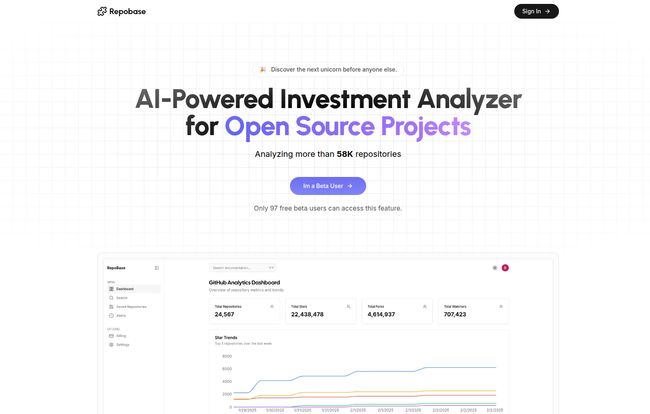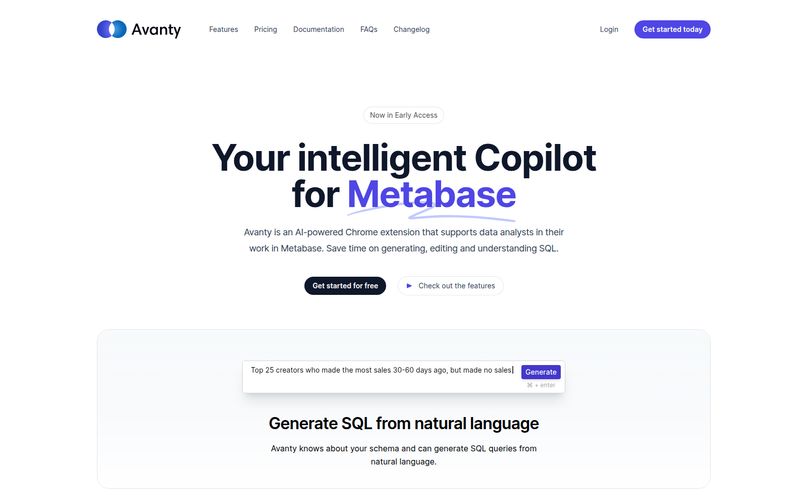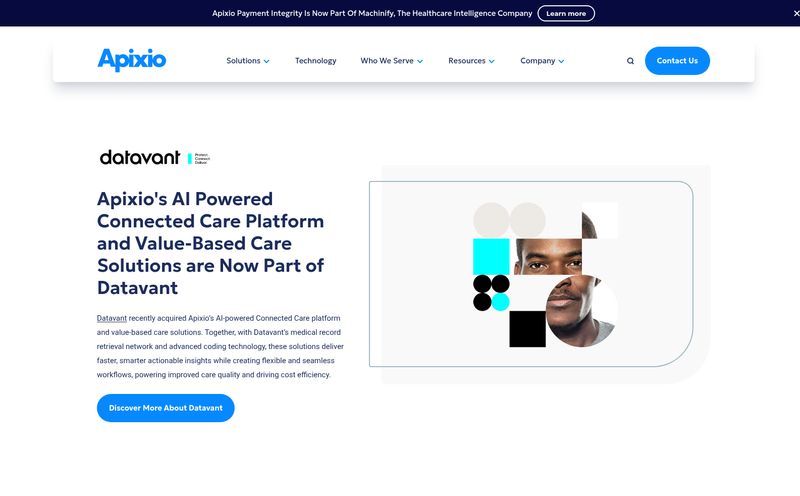I remember the exact moment I realized I’d missed the boat on Docker. It wasn't a single event, but a slow-dawning horror. One day, it was a niche project some smart folks were tinkering with; the next, it was everywhere. Job descriptions, conference talks, my entire Twitter feed. I had seen the repository. I had even starred it. But I didn't see the wave coming.
That feeling sucks. It's the classic signal-vs-noise problem that haunts anyone in tech, whether you're an investor looking for the next unicorn, a developer scouting new tools, or a marketer trying to figure out where the ecosystem is heading. GitHub is this magnificent, sprawling city of innovation, but it’s also chaotic. Finding the next big thing can feel like pure luck.
So, when I stumbled upon a tool called RepoBase, which claims to be an "AI-Powered Investment Analyzer for Open-Source Projects," my cynical-veteran-blogger senses started tingling. Is this another overhyped AI gimmick, or is it the tool I wish I had all those years ago? Let's find out.
So, What Exactly is RepoBase?
Let's strip away the marketing jargon for a second. At its core, RepoBase is a surveillance system for the open-source world. It hooks into GitHub and analyzes over 8,000 repositories daily. It’s not just looking at star counts, which can be a total vanity metric. It’s crunching data on commit velocity, contributor growth, issue resolution times, pull request trends, and a bunch of other signals to paint a picture of a project's health and, more importantly, its momentum.
Think of it as quantitative analysis for code. Instead of just getting a gut feeling about a project, RepoBase aims to give you a data-driven thesis. It’s designed to help you spot the fastest-growing, most promising projects before they hit the mainstream—before they’re all over Hacker News and everyone's jumping on board.

Visit RepoBase
The Features That Actually Matter
A tool is only as good as its features, and RepoBase has a whole suite of them. Some feel genuinely innovative, while others are smart applications of existing tech. I’ve grouped them by what they actually do for you.
Your Personal Open-Source Intelligence Agent
This is the heart of the platform. The Early Investment Radar and Intelligent Monitoring work together like a tireless scout. You can set custom alerts based on your own criteria. For example, maybe you're only interested in JavaScript projects that have gained more than 20 new contributors in the last month and are showing a 50% increase in commit frequency. You can set that up. RepoBase will then watch the market for you and ping you when a project matches your profile.
It's like having a junior analyst who never sleeps or asks for a coffee break. The daily digest feature rolls up the most interesting movements, so you get a high-level briefing without having to live on GitHub 24/7. This is the kind of stuff that separates casual observation from serious trend-spotting.
The AI Fortune Teller
Okay, "fortune teller" is my word, not theirs. They call it AI-Powered Repository Analysis and Market Predictions. This is where things get really interesting, and a little bit sci-fi. The AI doesn't just present raw data; it interprets it. It offers smart recommendations and investment insights based on a project's trajectory, market viability, and overall health.
It also includes a Risk Assessment component, which is critical. Hype is one thing, but understanding the potential pitfalls—like a project being overly reliant on a single developer or having a toxic community culture (which can sometimes be gleaned from issue trackers)—is just as important. It’s designed to be a comprehensive due diligence assistant.
Just Talk to the Bot
One of the coolest, most practical features is the AI Chatbot. We've all been there: you land on a promising GitHub repo and spend the next 20 minutes trying to decipher a poorly written README file. What's the core library? What's the license? Who are the main competitors? The RepoBase chatbot lets you just ask these questions in plain English. It's already ingested all the project details, so it can give you a quick summary, saving you a ton of manual research. A simple, but brilliant, quality-of-life improvement.
The Good, The Bad, and The AI
No tool is perfect, and my job is to be skeptical. After digging through what RepoBase offers, here’s my honest take.
What I'm genuinely excited about is the potential to democratize insight. For years, this kind of deep, quantitative analysis was the domain of well-funded VC firms with their own data science teams. RepoBase could level the playing field, giving smaller investors, or even just curious developers, the same superpower. It’s a powerful signal-from-noise machine that could save hundreds of hours of manual work. Finding those hidden gems before they explode is the holy grail, and this tool is one of the first I've seen that takes a systematic approach to it.
Now, for a healthy dose of realism. The biggest caveat is right there in the name: AI-powered. An AI is only as good as its' data and its model. It can't measure the qualitative stuff. It can’t tell you if the lead developer is a visionary or a tyrant. It can't feel the passion and buzz in a community Discord channel. Data can tell you what is happening, but it can't always tell you why. For instance, a project might see a huge spike in activity because it was just acquired and is being sunsetted, not because it's growing. Context is everything, and you still need human judgment. My advice? Use this as a powerful starting point, not the final word.
Another limitation is that it's currently focused solely on open-source projects on GitHub. That covers a massive part of the software world, sure, but not all of it. And, as of writing this, access is limited to a small beta group. It's not something you can just sign up for and start using today.
So, Who Is This Actually For?
I see a few key groups getting a ton of value from this.
- Venture Capitalists & Angel Investors: This is the most obvious one. Being able to automate the initial sourcing and due diligence process for tech investments is a massive advantage.
- Developers & Engineering Managers: Should we adopt this new library? Is this framework gaining real traction or is it just a flash in the pan? RepoBase could provide the data to make smarter technology choices.
- Tech Journalists & Analysts: Hey, that's me! Being able to spot trends backed by data instead of just Twitter chatter? Yes, please.
The Million-Dollar Question: What's the Price?
Here’s the catch. As of now, there is no public pricing. RepoBase is in a closed beta, and the website mentions they are only looking for a handful of beta testers. You can join a waitlist, but you can't just pull out your credit card and get going.
Honestly, this makes sense. They're likely refining the AI models and ensuring the insights are truly valuable before a wider release. I'd expect a tiered pricing model in the future, perhaps with different levels of access for individual developers versus enterprise investment firms. For now, it remains an exclusive club.
Frequently Asked Questions about RepoBase
I've seen a few questions pop up, so let's tackle them head-on.
Is RepoBase just for rich investors?
While investors are a prime audience, the insights are valuable for any developer or company that builds on open-source software. Knowing which technologies are gaining real, sustainable momentum can save you from betting on a dying horse. It's a strategic tool for builders, not just backers.
How is this different from just sorting GitHub by stars?
Oh, it's night and day. Stars can be easily gamed and often represent historical popularity, not current momentum. RepoBase looks at dynamic metrics like the speed of development, the growth of the contributor base, and how quickly issues are being resolved. It's the difference between looking at a company's stock price from a year ago versus its latest quarterly earnings report.
Can it really predict the next React or Vue?
"Predict" is a strong word. I'd say it can identify projects with the same characteristics that made React and Vue successful in their early days. It can show you a project that's on a steep upward trajectory. It gives you a short list of candidates to investigate further. It's not a magic eight ball, but it's a very powerful metal detector.
Is the AI analysis truly reliable?
Reliability will depend on the model's sophistication. It's a tool for augmenting human intelligence, not replacing it. The data on commits and pull requests is objective. The AI's interpretation of that data is where you need to apply your own expertise. I'd trust it to surface opportunities, but I'd do my own deep research before making a major decision.
When will RepoBase be available to the public?
That's the big unknown. The best you can do right now is sign up for the waitlist on their website and keep an eye out for announcements. Given the demand for tools like this, I suspect they won't stay in a closed beta forever.
Final Thoughts: A Glimpse of the Future?
I went into this review with my usual dose of skepticism, and while I still have some reservations about an over-reliance on AI, I'm coming away genuinely impressed. RepoBase is tackling a real, thorny problem that almost everyone in the tech industry faces.
It's not going to hand you a winning lottery ticket. You still have to do the work. But it might just be the tool that tells you which convenience store is most likely to sell one. By turning the chaotic art of trend-spotting into something closer to a science, RepoBase is a fascinating development. I'll be watching this project's own repository very, very closely. And this time, I'll be using more than just a gut feeling.
Reference and Sources
For further reading and to join the waitlist, you can check out the official sources below.
- The official platform website: RepoBase.com
- An interesting perspective on the value of open source from opensource.com: How to build a business with open source software



